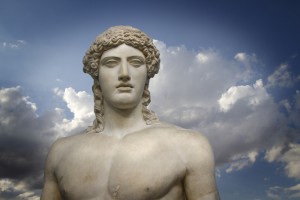Shakespeare’s Sonnet #94 “They that have power to hurt and will do none”

Who, moving others, are themselves as stone,
Unmovèd, cold, and to temptation slow,
They rightly do inherit heaven’s graces
Reading of Sonnet 94
Click on video to play
The images in the YouTube video are from an original 1609 edition of Shake-speares Sonnets held by the British Library. It is one of only thirteen copies in existence. Images courtesy of the Octavo Corporation.
Modernized Spelling and Punctuation
They that have power to hurt and will do none,
That do not do the thing they most do show,
Who, moving others, are themselves as stone,
Unmovèd, cold, and to temptation slow,
They rightly do inherit heaven’s graces
And husband nature’s riches from expense;
They are the lords and owners of their faces,
Others but stewards of their excellence.
The summer’s flower is to the summer sweet,
Though to itself it only live and die;
But if that flower with base infection meet,
The basest weed outbraves his dignity.
For sweetest things turn sourest by their deeds;
Lilies that fester smell far worse than weeds.
Simplified Modern English Translation
They that have the power to hurt, yet will not do so,
that do not abuse the terrible power they possess,
who, moving others, are themselves as stone,
unmoved, cold, and not easily tempted,
they rightly do inherit heaven’s good fortune,
and are prudent controllers of nature’s power.
They are the lords and owners of their appearance,
with others being fortunate recipients of their excellent gifts.
The summer’s flower presents a beauty that is enjoyed by all,
though, from its own point of view, it is only being itself;
but if corruption should infect that flower,
it becomes worse that the most loathsome weed in the field.
For there is nothing more sour than the corruption of benevolent power;
the most beautiful flowers, if they become rotten, smell far worse than weeds.
Text from Original 1609 Quarto
Transcription courtesy of University of Virginia Library:
They that haue powre to hurt, and will doe none,
That doe not do the thing, they most do showe,
Who mouing others, are themselues as stone,
Vnmooued, could, and to temptation slow:
They rightly do inherrit heauens graces,
And husband natures ritches from expence,
They are the Lords and owners of their faces,
Others, but stewards of their excellence:
The sommers flowre is to the sommer sweet,
Though to it selfe, it onely liue and die,
But if that flowre with base infection meete,
The basest weed out-braues his dignity:
For sweetest things turne sowrest by their deedes,
Lillies that fester, smell far worse then weeds.